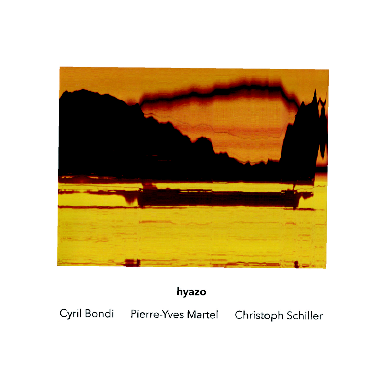Another Timbre TimHarrisonbre
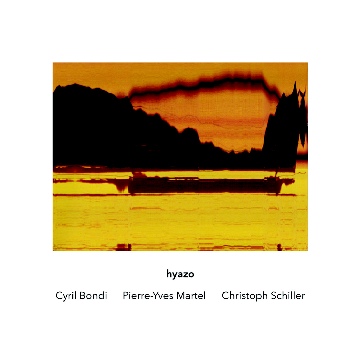
Cyril Bondi | Pierre-Yves Martel | Christoph Schiller
1. ‘Palestrina’ (Christoph Schiller) 17:00
2. ‘Cartes no.3’ (Christoph Schiller) 11:22
3. ‘Hyazo’ (Cyril Bondi) 24:21
Cyril Bondi - Indian harmonium, pitch pipes, harmonica
Pierre-Yves Martel - viola da gamba, pitch pipes, harmonica
Christoph Schiller - spinet & preparations
Ben Gaunt interviews the trio
How did the process for this recording differ to your previous Another Timbre releases?
Christoph Schiller: In our first disc ‘tse’, as well as in the second one with Angharad Davies, we were working from a concept that is basically taken from a piece of mine called ‘die Schachtel’. But that’s a very open piece, and as we worked it out together I didn’t want to figure prominently as the composer. One of the pieces on the new disc is also from “die Schachtel“ (‘cartes no3’), but the other two tracks are more specific compositions (though still quite open). So there was a need to also define the ‘die Schachtel’-piece in terms of composition.
We’ve worked a lot with this concept, and for the new recording there was a plan to try new material, and to move forward somehow on the basis of our experience together and the work we’d done so far.
Ah, and of course: the previous disc (awirë) was a live recording. So there is naturally a difference in that respect.
Cyril Bondi: For this new album, I suggested we try a piece called ‘hyazo’ which I’d written especially for this trio, and which was inspired by the way we play together. ‘hyazo’ is a composition for three voices, where each voice is related to part of a saxophone solo that I like.
Could you tell me more about your approach to composition? Are these compositions a way of imposing restrictions?
CS: Imposing restrictions is definitely an important aspect. But it’s not for restrictions’ sake, but rather for creating ‘freedom’, that means for creating space for working more precisely with colour, timbre, durations etc.
I think composition is always one aspect of music – and the other pole is playing, sound in space, and interaction. In the field of improvised music (but not only here) people develop their own music, their own language, and concepts or compositions can focus/influence this given material. And, importantly, composition can coordinate ensemble players. In my pieces here, we usually have common sets of pitches for a given period of time. This allows us to play more freely, knowing that there will be correspondences.
The way we play these pitches (tempo, timbre…) is not given by me or by the composition. It’s something that the group develops together. I try to limit composition to what is necessary or makes sense, and that is generally the abstract part of the music. Composition provides a vessel for the work on texture and sound. (Of course, the vessel has influence on the work on sound, that’s true!)
But the two pieces by me on this disc have slightly different backgrounds: ‘die Schachtel’ is a set of structures, distilled from an older piece. I made this collection really without any vision of how it might sound. It was a plan to develop completely abstract structures, with as little indication for ‘music’ as possible. The collection contains much more material than we use in the trio. For developing the trio’s language the work with the pitch cards from the ‘die Schachtel’ was helpful. But we didn’t work with the cards with the idea of ‘interpretation of a composition’, we rather used them as a tool.
The other piece, ‘palestrina’ is part of a somehow similar, but much smaller setting (‘Missa’), which stays close to the Palestrina Mass I was working with. It’s meant to somehow invoke the soundworld of early music. So there was much more of a musical purpose already in the composition. And of course this moves the trio into a more specific - premeditated - direction.
But to go back to your initial question: imposing restrictions is the starting point, with the idea that I don’t necessarily ‘create’ music by composing, but I rather influence it.
CB: In the process of composition, you often have an idea, a concept and you want people to play it. In this context, with Pierre-Yves and Christoph, we had naturally created an aesthetic way of playing together. From the beginning we created a space of sounds, rhythms, silence, with the tacit rule of listening deeply to each other.
When I started to write the piece ‘hyazo’ for the trio, I tried to find a way to go into this aesthetic, to organise the sounds, but at the same time, to let everybody have enough freedom to interpret my indications.
The main idea for ‘hyazo’ was to catch different strong musical moments, and to find a way to extend them during a long piece. Years ago I used to listen to a lot of jazz music, from hard bop to free jazz. Today, when I listen to some of my favourite tunes, I always enjoy rediscovering those special moments in a solo where a simple change of note, a simple phrase sends a shiver down your spine, or makes you delve into an emotion, a forgotten memory.
I wanted to identify three of those moments that still accompany me today and bring them together on one piece. I quote three short phrases from a jazz solo in the hope of seizing the essence of these magical moments. Each musician represents one of those chosen moments, follows the movement through, deconstructs this ephemeral moment through sinuous paths and tries to prolong it through confronting it with a new space.
Pierre-Yves, what does it feel like to play these pieces? How do you respond to the
idea of compositions that impose some limitations/restrictions on what you play?
Pierre-Yves Martel: We had the chance to play these pieces twice in November 2019 — in two concert settings (at Christoph's atelier in Basel and in Ulrichsberg, Austria) and a few months later, in Geneva, which is when the recording session took place. I remember the pieces feeling and sounding quite different from one performance to the next. As we became familiar with the material, the pieces settled and became more poised with each performance. Lots of discussion was had in between each performance, on how we could be more precise with the given indications to ensure we had a common understanding of each composition. Imposing restrictions on my playing has always been a central aspect of my music making, so working with Christoph and Cyril is quite a natural and enjoyable process as they share these similar approaches.
What was the recording session like? Did anything interesting or unexpected crop up that shaped the release in some way?
CB: I am a member of the Insubordinations Collective that has a recording studio in Geneva called ‘Insub.studio’. In the past four years we've recorded an impressive amount of great sessions, such as the first album of this trio, ‘tse’, the double album ‘places and pages’ by Ryoko Akama, pieces by Stefan Thut, Taku Sugimoto, and obviously the pieces I composed hand in hand with d'incise.
Usually, I ask d'incise to record the sessions but this time he wasn't available. So I did it by myself for the first time... In principle that’s not a big deal, but for me it was quite intense to host my friends, propose a piece, play and take care of the recording session. So this album will always be a special session for me.
CS: To me it was astonishing to experience how the new pieces (‘palestrina’ and ‘hyazo’) both developed their own strong characteristics, given the fact that the pure playing technique was not essentially different from our approach in the card pieces from ‘die Schachtel’. The two pieces are different from each other when it comes to reading the score, but not so much in terms of tempi, timbre and communication. While playing, it was possible to enjoy listening to the compositions unfold.
All our pieces provide tasks for the performers, setting a frame and absolving us from 'composing in the moment', at least as regards the broader form. This puts us into in a position as listeners, which is not only a joyful experience, but also helps us to keep a distance from the material.
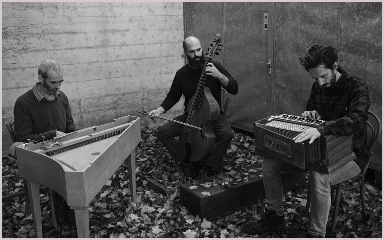
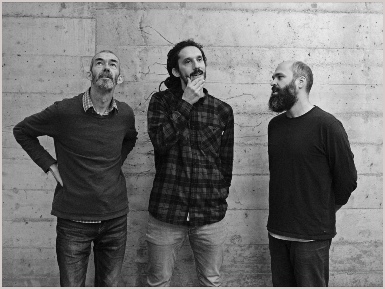
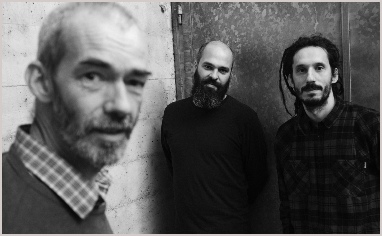
Christoph Schiller, Cyril Bondi, Pierre-Yves Martel
